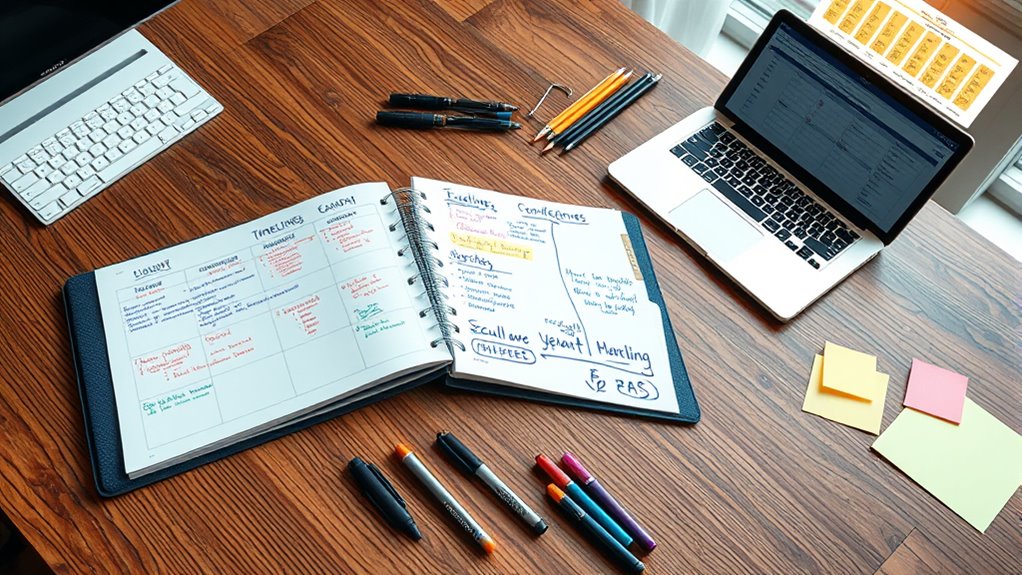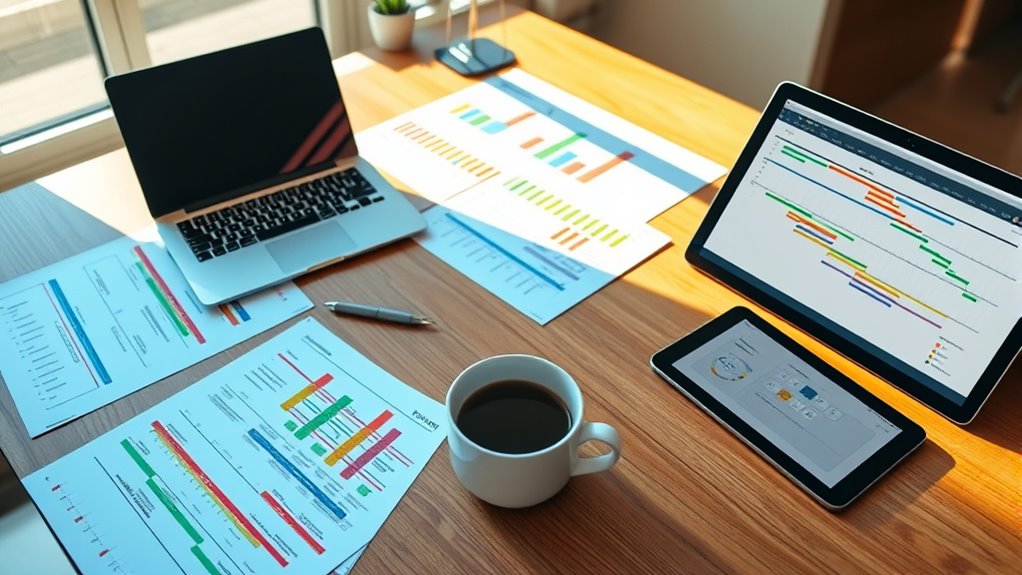Creating and managing event timelines and schedules is key to a smooth planning process. Start by listing all tasks and deadlines, like booking venues, sending invites, and arranging catering. Track progress regularly to stay organized and address issues early. Communicate clearly with attendees and vendors to keep everyone informed. Maintaining a detailed schedule guarantees nothing gets missed. Keep following these steps, and you’ll discover essential tips for staying on track and executing a successful event.
Key Takeaways
- Develop a detailed event timeline that includes all planning stages, deadlines, and responsible parties for organization.
- Schedule venue visits and bookings at least 6 months in advance to secure preferred dates and assess logistics.
- Send timely communications like save-the-dates and RSVP reminders to keep attendees informed and engaged.
- Track RSVP responses, dietary preferences, and logistical details to ensure smooth guest coordination.
- Regularly review and adjust the schedule to address potential issues early and keep all tasks on track.

Planning a successful event starts with creating a clear and detailed timeline. This foundational step helps you stay organized and guarantees that every element, from venue selection to guest coordination, falls into place smoothly. When you develop your timeline early, you set realistic deadlines for booking the venue, arranging catering, sending invitations, and finalizing entertainment. You’ll know exactly when to make vital decisions and follow up on outstanding tasks, preventing last-minute surprises.
Venue selection is often one of your first major milestones. You want to secure a venue that suits your event’s size, style, and purpose, so schedule site visits well in advance—usually at least six months before the event. During these visits, evaluate logistics like accessibility, parking, and technical capabilities. Once you’ve chosen the perfect location, add it to your timeline, making sure to reserve the space early to avoid losing your preferred date. This step is essential because your venue choice influences many other components, including guest coordination. Once the venue is set, you can communicate clear directions and logistical details to your attendees, reducing confusion and guaranteeing everyone arrives prepared.
Guest coordination is another vital aspect that benefits from meticulous scheduling. As soon as your date and venue are confirmed, send out save-the-date notices, ideally six to eight months ahead, especially if you have VIPs or out-of-town guests. Use your timeline to track RSVPs, and establish deadlines for responses so you can plan seating arrangements and catering accordingly. Regularly follow up with invitees to keep engagement high. To streamline guest coordination, consider using digital tools that send automated reminders, share event updates, and gather additional information like meal preferences or accessibility needs. Incorporating these steps into your timeline guarantees you stay on top of communication and can adjust plans if guest numbers change.
Frequently Asked Questions
How Can I Handle Last-Minute Schedule Changes Effectively?
When last-minute schedule changes happen, stay calm and use contingency planning to adapt quickly. Keep flexibility strategies in mind, such as having backup vendors or alternative activities ready. Communicate promptly with your team and attendees to manage expectations. By staying adaptable and prepared for surprises, you can handle schedule shifts smoothly, ensuring your event remains successful despite unexpected adjustments.
What Tools Are Best for Collaborative Event Scheduling?
You should use digital calendars like Google Calendar or Outlook for collaborative event scheduling, as they allow real-time updates and easy sharing. Incorporate project management tools such as Asana or Trello to coordinate tasks and deadlines seamlessly. These tools help you keep everyone on the same page, facilitate communication, and adapt quickly to changes, ensuring your event runs smoothly and everyone stays aligned throughout the planning process.
How Do I Prioritize Conflicting Event Activities?
When prioritizing conflicting event activities, you should analyze resource allocation to see which tasks are essential and feasible. Consider the risks involved and identify critical activities that impact the overall event success. Communicate with your team to reassign resources if needed and adjust schedules accordingly. You’ll want to balance priorities, minimize risks, and guarantee that high-impact tasks get completed on time, keeping the event running smoothly.
What Are Common Pitfalls in Timeline Creation?
You risk poor timeline accuracy if you overlook realistic time estimates, causing delays. Don’t forget to build in buffer time to allow schedule flexibility for unexpected issues. Avoid overloading your schedule with too many activities at once, which can lead to conflicts and missed deadlines. Regularly review and adjust your timeline to stay on track, ensuring your event’s schedule remains both accurate and adaptable to changing circumstances.
How to Ensure Attendee Engagement Throughout the Schedule?
You can keep attendee engagement high by incorporating interactive sessions that encourage participation and foster connection. Regularly solicit attendee feedback to understand their interests and adjust the schedule accordingly. Break up long sessions with activities or Q&A segments, making the experience more dynamic. By actively involving your attendees and paying attention to their input, you create a more engaging event that motivates continued involvement throughout the schedule.
Conclusion
Now that you know the essentials of creating and managing event timelines, you’re ready to take charge. But remember, even the best plans can face unexpected hurdles. Will your schedule hold up under pressure? The key is staying flexible and prepared for surprises. Keep refining your approach, and you’ll master the art of seamless event management. The success of your next event depends on what you do next—are you ready to make it unforgettable?









